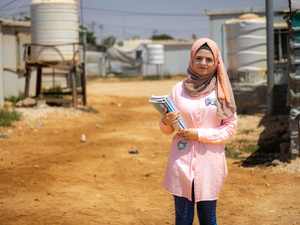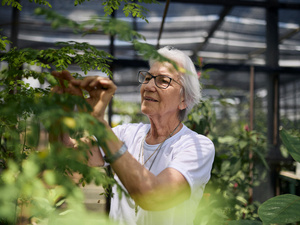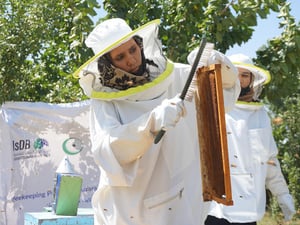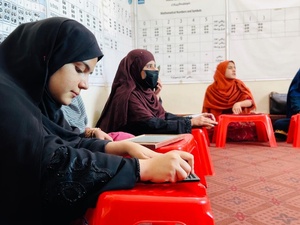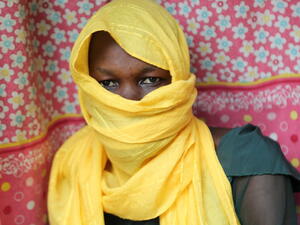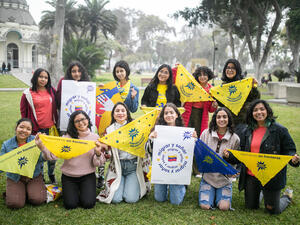Abused woman granted refugee status in Hungary
Abused woman granted refugee status in Hungary

Before receiving refugee status in a landmark gender/domestic violence case, Azita had to resort to smugglers to bring her to safety in Hungary, where strengthened border controls make entry difficult for economic migrants and refugees alike.
BUDAPEST, Hungary, November 1 (UNHCR) - Tormented, ostracized, shamed and illiterate Azita may be - but her will is unbroken. This is how she made it to Hungary, where she was granted asylum based on the domestic violence and social exclusion she suffered as a woman, and the lack of any protection by the authorities in her home country.
When Azita [not her real name] arrived in Hungary after years of suffering, she did not even know what an asylum procedure was. She was just looking for a safe haven. In considering her claim well-founded and granting her refugee status, the Hungarian asylum authorities have joined the ranks of an increasing number of countries who recognize domestic violence as a form of gender-specific persecution - a move welcomed by the UN refugee agency.
"This decision is proof of the flexibility and lasting validity of the refugee definition as contained in Article 1 of the 1951 Convention Relating to the Status of Refugees," said Lloyd Dakin, UNHCR's representative in Hungary. "We are pleased with the fact that, more and more frequently, gender-related persecution is recognized as falling within the ambit of the 1951 Convention."
Historically, the refugee definition has been interpreted through a framework of predominantly male experiences, which has meant that many claims by women have gone unrecognized.
In the past decade, however, the understanding of sex and gender in the refugee context has advanced substantially - a development UNHCR has promoted by providing legal advice and training, as well as by issuing specific guidelines. It is now a generally established legal principle that the refugee definition as a whole should be interpreted with an awareness of gender, and this principle has also been reflected in recent European Union legislation.
According to the 1951 Convention, a refugee is someone who has fled his or her country due to a well-founded fear of persecution because of his or her race, religion, nationality, membership of a particular social group or political opinion. Even though gender is not specifically mentioned in the refugee definition, it is widely accepted that it can influence or dictate the type of persecution or harm inflicted, and the reasons for such treatment.
Gender-related claims have been recognized on the basis of many forms of persecution, including acts of sexual violence, domestic violence, forced abortion or sterilization, female genital mutilation, punishment for transgression of social mores, dowry-related violence, forced/early marriage, honour-related crimes and trafficking.
Azita was married off to a man three times her age when she was only 13 - before she knew what sexual relations entailed. "I never knew any other form of sex but rape," she says, sitting in the refugee reception centre in the eastern Hungarian city of Debrecen.
The girl became pregnant immediately and, due to her young age, nearly died during childbirth. After more than three months in hospital, she was returned to her husband and the rapes and daily beatings continued. Although the doctors strongly advised against another pregnancy before she was 18, Azita's husband made her pregnant again right away. When she turned 18, she already had three children, with three more to follow.
During her seventh pregnancy, at the age of 25, her husband kicked her so hard that she was severely injured and lost the baby. When it emerged that she would stay barren for the rest of her life, he took all their children away, threw her out of the house, and divorced her.
An even worse predicament awaited Azita: "In my society you are disgraced as a divorced woman," she explains. She was forced to live in the streets, and to work just to get food or a place to sleep indoors for a night or two. "I had uncles in that village, but they could not keep me for more than a few days from time to time, because their wives were against it. While everybody blamed me for abandoning my children, I was sick with longing for them. I would even have endured the beatings again, just to be with my sons and daughters."
Azita carried on living on the margins of society for many years with no protection. A single dream kept her going: to join some of her brothers and sisters who live in Finland.
Finally, she got in touch with people smugglers who promised to bring her there. With help from her siblings, and the little money she herself had managed to save, she left her country. She was under the illusion she would be taken to Finland, but instead her smugglers dumped her alone and helpless in Hungary.
Here, Azita says she went through the asylum procedure without even understanding exactly what it was. She simply relied on her faith in God and the goodness of the people in the Debrecen refugee reception centre.
According to Dr. Agnes Garamvölgyi, Director of Refugee Affairs in the Hungarian Ministry of Interior, "There are many who are recognized on the grounds of belonging to a certain social group. She was granted asylum because she was persecuted, and belongs to a particular social group. We had no doubt about that. However, the case of Azita who became uprooted [in the Middle East] because of domestic violence can indeed be considered as a unique case."
Many countries accept that women, or a narrower sub-group of women, can constitute a particular social group under the 1951 Convention. Yet there are relatively few cases where women who have been subjected to serious violence at the hands of family members have been recognized as refugees. Asylum has nevertheless been granted to survivors of such violence by Argentina, Australia, Canada, Ireland, Romania, Spain, the United Kingdom - and now Hungary.
However, not all abused women are automatically entitled to refugee status.
Each case needs to be analysed holistically, and within its own particular cultural and political context. How severe and persistent is the persecution or harm? If the fear of persecution is well-founded, is it related to one or more of the Convention grounds? What protection does the applicant have in law, and in fact? Is the persecution knowingly tolerated by the authorities? Are the authorities unable or unwilling to offer protection? Could the woman find safety somewhere else in her country?
In the case of Azita, she was found to have a well-founded fear of severe and persistent harm because of her status as a divorced woman in a society which offered her no protection.
Azita is unaware of all the sophisticated legal issues and debates about gender-related persecution and refugee status determination. All she wants is to feel safe, and if possible to join her brothers and sisters in Finland.
By Melita H. Sunjic in Budapest, Hungary

